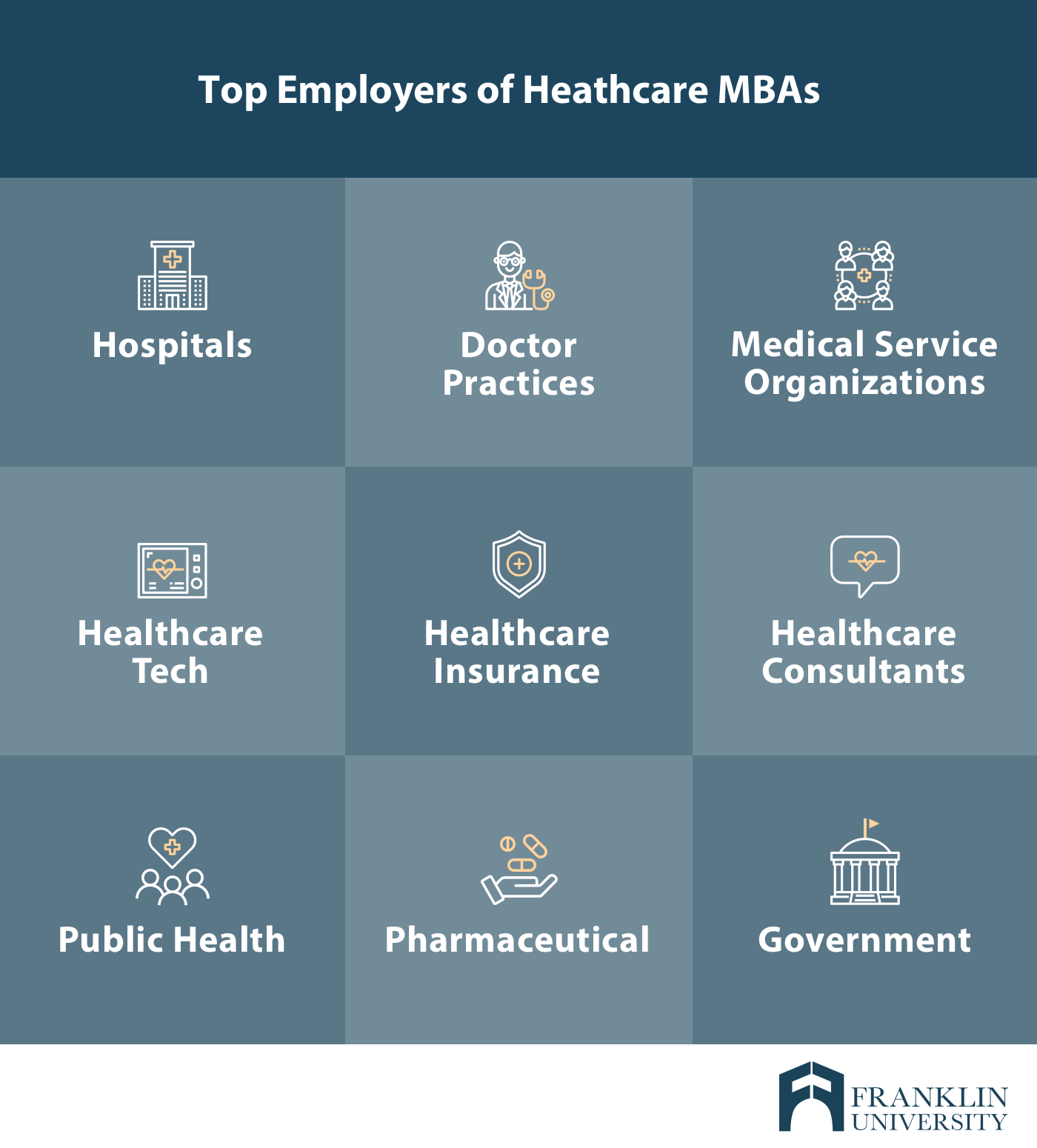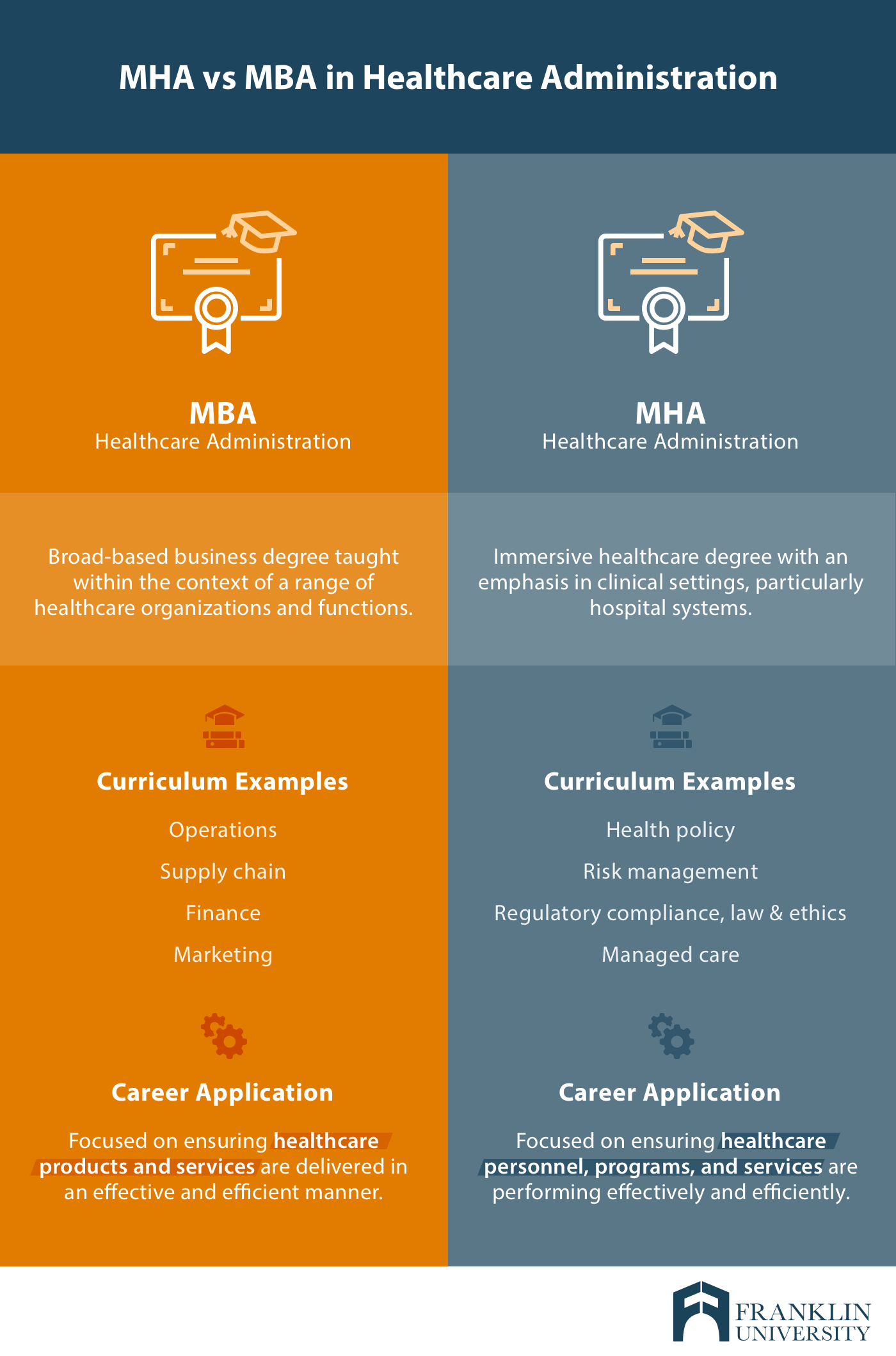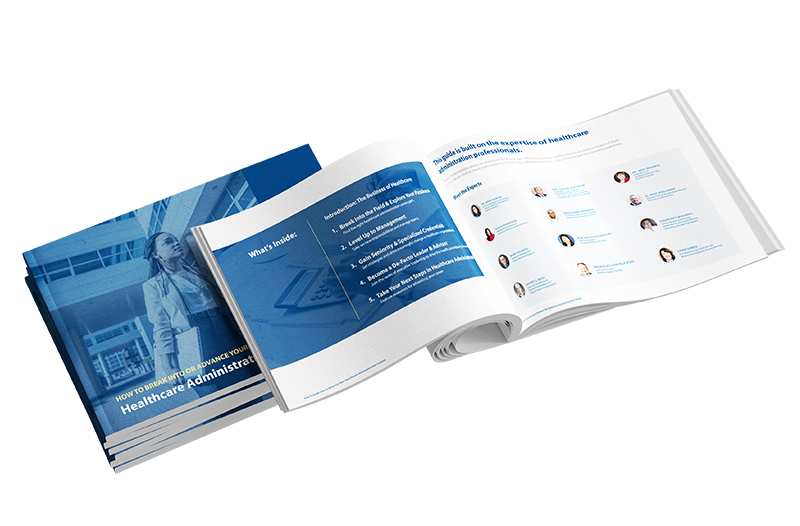Request Information
We're Sorry
There was an unexpected error with the form (your web browser was unable to retrieve some required data from our servers). This kind of error may occur if you have temporarily lost your internet connection. If you're able to verify that your internet connection is stable and the error persists, the Franklin University Help Desk is available to assist you at helpdesk@franklin.edu, 614.947.6682 (local), or 1.866.435.7006 (toll free).
Just a moment while we process your submission.

6 Incredible MBA Healthcare Administration Jobs
Healthcare is a critical industry in our society—one filled with opportunities and growth potential. For ambitious and passionate professionals, it can also be a very rewarding career path. However, to excel at the management and leadership levels you need specialized expertise and education.
The MBA has long been the gold standard for leadership. Now, many MBA programs offer students the opportunity to specialize in healthcare, giving them the same rigorous curriculum and management skills within the context of the healthcare industry.
An MBA with a specialization in healthcare can help you advance your career—whether you’re a clinical practitioner looking to move into an administrative role, a medical student looking to stand out for residency selection, or a nonclinical professional looking for new opportunities in healthcare.
If you’re considering an MBA in healthcare, it’s important to know the career paths this degree is best suited for. Let’s look at some of the top jobs for professionals who choose to pursue an MBA in healthcare administration.
Top Career Paths And Jobs For Professionals With A Healthcare MBA

An MBA in healthcare prepares you for a wide range of career possibilities in a competitive industry. These roles typically fall into two workplace categories—clinical and non-clinical. An MBA with a focus in healthcare administration can lead to top career prospects in any of these work environments.
Let’s dive deeper and look at 6 popular jobs for professionals across the healthcare spectrum who can excel with a healthcare MBA.
Healthcare Consultant | Average Salary: $83,490*
Healthcare consultants act as analysts, helping healthcare organizations identify opportunities to reduce costs while increasing revenue—without sacrificing quality of care. Having a strong understanding of healthcare-related operations is crucial to determine efficiencies and methods for implementation.
According to Forbes, the healthcare services market (which includes healthcare consulting) is a $50 billion+ industry, and continues to grow exponentially without any signs of slowing down. This market demand makes the career outlook for healthcare consultants bright—offering both stability and growth opportunities.
*(Salary.com)
Medical and Health Services Managers | Average Salary: $104,280*
Medical and health services managers develop strategies, organize systems and run operations at medical facilities, specific clinical departments, or a group medical practice. They are responsible for adapting to complex changes in healthcare laws, regulations, and technology.
Medical and health services managers work closely with physicians and surgeons, registered nurses, medical technologists, and other front-line healthcare workers. This work environment makes this position ideal for healthcare practitioners who are looking to move up the ranks and take on an administrative role.
Plus, with demand for medical and health services managers increasing rapidly—expected to grow by 32% by 2029—these professionals can expect long-term career stability.
*(BLS)
Advance your career in Healthcare Administration while you advance patient care. Download your free career guide.
Healthcare Sales/Marketing Manager | Average Salary: $122,556*
These professionals direct sales and marketing activities for healthcare organizations. For example, a sales and marketing manager for a long-term care facility is responsible for reaching occupancy targets and ensuring the brand is well-recognized and respected in the community in which it operates. On the other hand, marketing managers at healthcare technology companies are responsible for increasing awareness and adoption of their product or service.
As digital transformation is still in its infancy in healthcare, marketing and sales managers have the opportunity to harness technology to transform their organizations.
To succeed, both written and verbal communication skills are key, and a Healthcare MBA can provide more specialized skills in marketing to round out your experience and talents.
*(Salary.com)
Public Health Policy Analyst | Average Salary: 81,335*
Public health policy analysts gather and evaluate data on current and potential policies regarding health and health care in their community or organization. Many work for the government, NGOs or nonprofits. They aim to improve education, aid in disease prevention, and promote healthy lifestyle changes, as well as determine costs and benefits of public health policies.
These professionals need a strong analytical background, critical thinking and communication skills, as well as in-depth knowledge of healthcare policy and regulations.
*(ZipRecrutier)
Pharmaceutical Project Manager | Average Salary: $93,156*
Pharmaceutical project managers are responsible for ensuring projects are properly planned, resourced, and managed to ensure on-time completion. In a pharmaceutical role, this could include ensuring compliance with regulatory bodies and keeping research records.
Two of the most significant disruptors in the pharma industry are, and will continue to be, digitization and advanced analytics. As more transformational initiatives are undertaken, the need for sophisticated project managers with a strong healthcare background will only increase.
This role is a great fit for people who have strong leadership and organizational skills and have a knack for developing efficient systems to get work done.
*(Salary.com)
Health Insurance Operations Director | Average Salary: $153,48*
Health insurance operations directors oversee programs in multiple services areas—from account installation and implementation to client support and claims processing. These professionals have deep knowledge of health insurance functions, so this role is a good fit for someone with a background in the field.
Health insurance is complex and highly-regulated, making qualified operations directors critical to success. To excel, you will need strong management abilities and systematic problem-solving skills.
*(Salary.com)
Why Choose an MBA in Healthcare Administration Over an MHA?
Many healthcare professionals weigh the choice of getting a Master of Healthcare Administration (MHA) or an MBA with a specialization in healthcare administration. Both degrees prepare you for leadership roles in healthcare organizations, but depending on your career aspirations, one may be a better fit than the other.
Let’s look at how an MHA and MBA in healthcare compare.

“There are areas of overlap between the MHA and MBA with a healthcare specialization,” says Dr. Leslie Mathew, Program Chair of the Master of Healthcare Administration & Healthcare MBA at Franklin University. “The MBA in healthcare is the more flexible choice, offering a broader scope of career options outside of a clinical healthcare setting. However, even those with clinical experience may choose an MBA with a healthcare specialization to gain business skills they don’t learn in medical or nursing school.”
If you’re trying to determine if a healthcare MBA is right for you, ask yourself these questions:
- Do I want the option to work in a variety of clinical and non-clinical work settings?
- Is my primary goal to gain business and management skills that can be applied to healthcare, rather than in-depth knowledge of healthcare systems, regulations and administration related to patient care?
- Am I looking for a way to stand out from other candidates who may only have healthcare experience, rather than broader business expertise?
- Do I want to start my own clinical practice or healthcare business?
If you answered yes to many of these questions, an MBA with a healthcare specialization may be the right degree for you.
Find the Right Healthcare MBA Program For Your Goals
The next step in your journey to a healthcare MBA is finding the right university and program to meet your needs as a student. Many professionals choose to pursue an MBA with a healthcare specialization in addition to other work or educational pursuits. It’s common for medical students, clinicians, and healthcare technology professionals to pursue their healthcare MBA, necessitating a flexible and online option for getting their degree.
Franklin University offers a high-quality, online MBA with a healthcare specialization that’s designed for working adults. Every course is tailored to healthcare, helping you apply business principles to daily decision-making in this dynamic industry. Franklin helps you build your network as you go, preparing you to advance your career or start a new endeavor.
Learn more about the advantages of the MBA with a healthcare specialization to see how it can help you achieve your goals.





